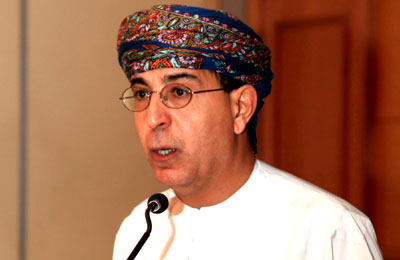
Oman 'must adopt smart road technologies'
Muscat, May 22, 2013
Oman must adopt smart road technologies and related applications to help reduce congestion, ease traffic and improve the operational performance of transportation lines in the Sultanate, said a senior government official.
"These technologies play a vibrant role in reducing congestion, easing traffic, providing multiple environmental benefits, and increasing overall productivity, which leads to economic and employment growth," observed Hilal bin Hamad Al Hasani, the CEO of Public Establishment for Industrial Estates.
Al Hasani was delivering his address at the Smart Road Technologies Seminar held on Tuesday at Grand Hyatt Muscat under the auspices of Salim bin Mohammed Al Nuaimi, the undersecretary for Transport, Ministry of Transport and Communications.
The event was organised by Knowledge Oasis Muscat (KOM), the technical arm of PEIE, in co-operation with Royal Oman Police and Industrial Innovation Centre (IIC).
The seminar focused on the development of data strategies and analysis to provide better intelligence for improvement of safety for road users besides finding innovative ways to increase pedestrian safety; and advancements and challenges in the implementation of smart road systems.
Captain Mohammed Al Khayari of Royal Oman Police, said the country was witnessing rapid growth in road networks as a result of human growth and urban and tourism development, which makes it imperative for stakeholders to implement roads in the Sultanate taking into consideration the introduction of these technologies.
"We will witness a high-tech future especially in this field. These technologies will play a significant role in reducing traffic accidents, for instance drivers can be noticed on the existence of a malfunction in the road for any reason that may cause accidents," he noted.
"This can be done through sending a message to passing cars in a particular spot. Besides, certain technology means can adjust the speed of vehicles in a particular spot to a certain speed as per the road conditions, such as vehicle density, visibility level and weather conditions," said Capt Mohammed.
"Furthermore, certain technologies can activate interaction between vehicles and road equipment which can eventually avoid errors of drivers. Besides there are technologies which help drivers identify the passable and less crowded roads, and thus reduce probability of accidents," he added.
Dr Wahid Al Kharusi, the chairperson of Oman Road Safety Association said, "Certain technologies can play a role in reducing the number of road accidents through relaying positive messages for road safety advocacy, awareness, education and capacity building. We need to stop repetitive negative messages."
Darren Divall, principal consultant at UK's Transport Research Laboratory believes that Oman’s executive regulations reflect the modern safety technologies that are now entering the Sultanate’s road network.
"The vehicle fleet in Oman is equipped with modern safety technologies, for example seat belts and child restraint systems. Enhanced legislation is required to make the use of these devices compulsory in all seating positions. In terms of the highway, technology must be used effectively to minimize road death and injury and efficiently manage the network to ensure the free flow of traffic," he pointed out.
For the Sultanate, Divall aspires to see a road network that uses modern technologies sush as CCTV, GIS tracking systems and smart mobile phone technology, thus enabling relevant stakeholders to understand traffic flow, measure speed, efficiently collect and analyse crash data and manage incidents.
On the obstacles being faced in implementing smart road systems, Divall said, "The biggest issue that I am aware of is the public’s perception of this type of technology and how it can be used. For example, the use of CCTV in Oman to monitor traffic flows and incidents would not, in my opinion, be welcomed."
Road safety and highway management campaigns are the need of the hour to raise awareness on the need for this type of technology amongst road users, he stated.
Solomon Alexis, principal lecturer at the University of East London, said, "As with any new or introduced technology the key is adoption, maintenance and usage. Oman can take advantage of new technologies such as GPS combined with Radio Data System - Traffic Message Channel that delivers real time traffic information to navigation devices."
"Also, the use of composite mats which uses natural materials could be used in the construction of temporary roads especially those needed where major constructions are taking place," he added.
The seminar was moderated by Dr Abdullah bin Mohammed Al Zakwani, executive director of IIC.-TradeArabia News Service







